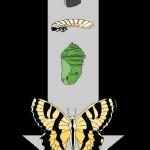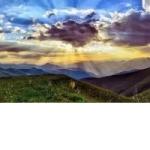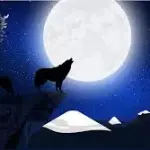 (This article is written by guest author Crysta Bliss. For her short bio, see below.)
(This article is written by guest author Crysta Bliss. For her short bio, see below.)
Intro
Many stories of mythology and folklore, such as Beowulf, The Odyssey, and the stories of King Arthur and the Round Table, are based on a human’s journey. During this journey, the protagonist of the story encounters various antagonists and great hardships, but in the end succeeds in his or her quest. The hero returns home with something of value for his or her society, but also with a great gain of self-knowledge.
Such stories are told by parents to lure children to sleep, by travelers around campfires, by teachers to educate students. Such stories of human journey and exploration have perhaps been the inspiration for many pioneers, pilgrims, sailors, and astronauts. The people who up to the present time have carried on the tradition of journey, adventure and discovery.
Last month marked the anniversary of one of the greatest of these voyages. Not a mythic adventure, but to the people of centuries past, it would have seemed as magical and marvelous as any of the great myths. This, of course, was the anniversary of Apollo 11, which resulted in humans walking on the moon.
While most of us will never experience adventures on such a grand scale, we still desire adventure and exploration in our lives. Perhaps it is moving to a new state or country, or travel to exotic places, but we still have an itch to see new places and experience new things. This longing for adventure seems to be deeply rooted in us.
Why do we explore?
While we in the modern world may be able to travel just to satisfy an itch in our hearts, many people, past and present, have needed to set off just to survive. In early times this was often to find water, food, and security. In modern times it is often to escape war, tyranny, or persecution.
Whether forced to travel by unfortunate circumstances or choosing to travel out of a desire to experience new things, the long history of human journey has progressively lead to greater human knowledge, both of the natural world and of human possibilities.
What has it done for us?
Imagine everything you currently know about explorers — Marco Polo, Christopher Columbus, Neil Armstrong, to name a few. Now imagine if they never existed. It may be simple to imagine life without flight or other modern transportation means. The Amish get by without them. Similarly we can imagine life without modern communication and media such as cell phones and television. People lived without them for thousands of years.
What if there were no books or even words. What if we still used hieroglyphics? Well, you get the picture. There is a lot to be said for ongoing discoveries that adventurous humans have gained for us down the course of time.
Of course, there are negatives to all of this. I can sympathize with a Native American who says, “I wish Columbus had stayed home.” And many of us might feel that the negative consequence of the internal combustion engine are beginning to outweigh the positives. Perhaps the Amish were wise in knowing when enough was enough. Had we stopped with the railroad, perhaps the modern world would be less unpleasant.
But it doesn’t seem to be in our nature to stop. And so, for better or worse, we continue to explore and find new ways of doing things.
The Journey of Self Discovery
The old stories were based on daring journeys over land and sea, but in addition to making new geographical discoveries they also lead to greater self-development and knowledge.
For example, the story of Beowulf involves a strong warrior who is ambitious but an amateur in war. As the monster Grendel terrorizes Beowulf’s home, he sets off on a journey to defeat this formidable enemy. Beowulf’s exposed weakness was his lack of experience in war, but his ambition proved strong enough to pull him through his journey. At the end he learned the skills of a great warrior, which allowed him to become a beloved king and to protect his kingdom from further threats.
Our own adventures are much more mundane than these old mythologies, but the challenge of travel often forces us from our comfort zone. We often encounter obstacles that we aren’t prepared for and have to call on inner resources that we might not have even known we had. We don’t gain much self-knowledge when we are completely comfortable.
Also, it’s often those hard and unpleasant parts of our travel, the part we probably enjoyed least when it was happening, that we are most likely to tell stories about later.
Stories
When did humans start telling stories? There is no way to know, but the evidence suggests that it was a very long time ago.
What were the early stories like? That too we don’t know. But we do have a few hints. There are cave paintings, some dating back to as much as 36,000 years ago. For instance, inside the Chauvet cave in France there is a representation of a volcanic eruption, which seems to depict a story of humans needing to move to a new home due to a natural disaster.
What we do know about human storytelling is that it has grown and evolved ever since. Luckily, many of those stories have been saved and collected and are available for us today.
Continuing the Journey
As mentioned earlier, we recently celebrated the 50th anniversary of the landing on the moon. It is quite possible that historians of the distant future will see this as the crowning achievement of the age we live in.
In addition to being a grand accomplishment, the requirements of space travel proved to be a significant stimulus to new inventions. It has had an impact on the way we do everything from building homes, scratch resistant glasses, CAT scans, LED lighting, athletic shoes, emergency blankets, water purification, home insulation, and many others.
Currently momentum is growing for humans to land upon, explore, and possibly colonize Mars. A new range of innovations will certainly come of this. One might argue that we would be better off using our resources to make the earth a better place to live, rather than for the rather questionable possibility of colonizing Mars. But whatever the merits of that argument, we’re likely to move forward. And possibly, what we learn in trying to make Mars habitable, will help us improve conditions on earth.
Conclusion
As mentioned earlier, many people are uprooted by conditions beyond their control and forced to travel. Making their situation worse, they often find great hostility in the places they go to seek a better life. It is a failure of the modern world that humans still have to suffer such hardships.
We who can voluntarily leave the comfort of our homes to go seek adventure, perhaps in the wilderness or some distance city, are very lucky. That we can travel in search of new knowledge and personal growth is also a great good fortune.
It is perhaps ironic that many people do leave the comfort of homes and routines and seek a simpler life. Some people willingly become nomads. Many people spend a season or more on rugged expeditions such as hiking the Appalachian or Pacific Crest Trail. Perhaps there is just something unnatural about continually being safe and comfortable which causes people to embark on such journeys. Perhaps we have some innate need for exploration and discovery that causes us to disconnect from our comfort zone and reconnect with our ambition for discovery.
__________
The Spiritual Naturalist Society works to spread awareness of spiritual naturalism as a way of life, develop its thought and practice, and help bring together like-minded practitioners in fellowship.
Bio: Guest author, Crysta Bliss, is a 21 years old member of the Spiritual Naturalist Society. She is currently a grocer in an organic grocery/eatery apothecary shop in Staunton, Virginia. Her hobbies include hiking, jogging, playing guitar and singing. Her goals in life include being able to do freelance work and to travel).

















